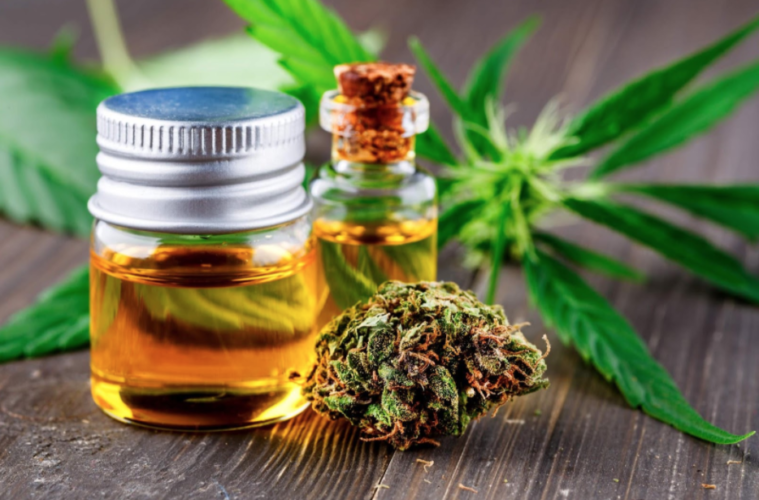Not getting enough quality sleep despite going to bed at normal times? Researchers have good news for you — CBD may be able to help.
If you’re suffering from sleep deprivation, you’re not alone, as this problem affects up to 70 million Americans every year, meaning that one in every five Americans struggles with poor sleep.
Without a doubt, this is a concerning figure when you consider how important sleep is for our health. Lack of sufficient sleep can impact everything from cardiovascular health to cognitive functioning to mood stability and weight management.
CBD is a natural non-intoxicating compound found in cannabis — mostly in the industrial hemp variety. It is also the modulator of the endocannabinoid system (ECS), the major regulatory network in humans. This system helps the body maintain homeostasis (internal balance) through a series of mechanisms, including sleep regulation.
Although CBD isn’t a magical pill for all your problems, studies suggest it can support healthy sleep cycles on top of reducing the collateral damage caused by sleep deprivation. Research is paramount if you want to find the best CBD oil for sleep, which is why we have put together our list of the top 3 brands that live up to premium quality standards.
Our Top 3 CBD Oils for Sleep Issues
Cannabis has been used in traditional medicine for centuries. Today, we are witnessing its renaissance as it makes big headlines in the world of contemporary medicine. This, in turn, creates a large demand on the market, and too many companies are trying to use CBD as a means of making easy profits.
There are a lot of sub-par products on the market, many of them using poorly sourced CBD extracts that don’t work. It’s important to know the features of high-quality CBD products before you hand out your hard-earned money
We have looked at a lot of scientific literature on CBD to get a good grasp of how it works and what can make or break its quality. We then took the time to research the most talked-about CBD brands on the market before providing our recommendations.
Below you’ll find the clean, hard facts, presenting these products without pushing hype.
1. Overall Winner: Royal CBD Oil
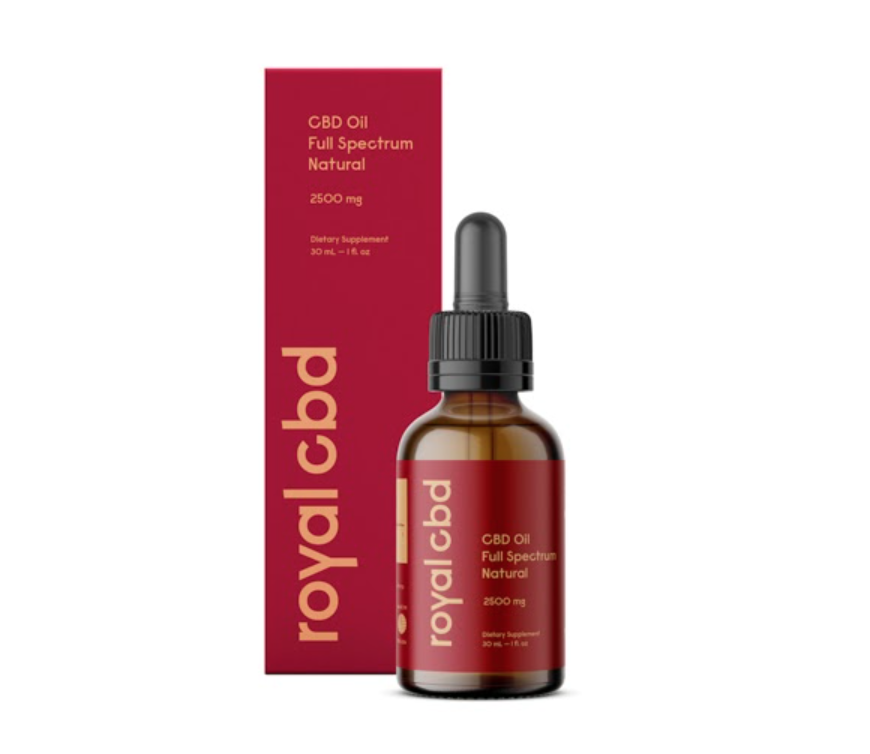
Pros:
- Non-GMO hemp is locally grown in Colorado
- Supercritical CO2 extraction
- Full-spectrum CBD
- Up to 83.3 mg of CBD per mL
- Several flavors available
- Batch-specific lab reports
Cons:
- Not available in local stores
- Slightly more expensive than competitors (although it still provides the best value)
Why Royal CBD Oil is the best CBD oil for sleep:
Consistently rated #1 by numerous publications (VentureBeat, We Be High, Daily CBD, and others) as the best CBD oil for sleep, Royal CBD offers a wide potency range for its CBD oils. You can choose between 250 mg, 500 mg, 1000 mg, and a whopping 2500 mg of CBD per bottle. The strongest version packs 83.3 mg of CBD in every milliliter, making this oil a decent option for people with more serious symptoms. Higher doses of CBD may have a calming and sedating effect on the body. The lower potencies are better suited for beginner users and lightweight people with milder sleep problems.
This top-notch CBD oil product comes from full-spectrum extracts, meaning it contains all the naturally occurring compounds from hemp, including the minor cannabinoids, terpenes, and traces of THC. Multiple studies have suggested that full-spectrum extracts are superior to isolated compounds, which makes them the preferred option among users.
Royal CBD also offers CBD softgel capsules, gummies, honey sticks, topicals, and vape pens to cater to different types of consumers. The entire collection comes with batch-specific certificates of analysis (COA) which the company sends via email.
2. Best Organic Formula: Gold Bee CBD Oil
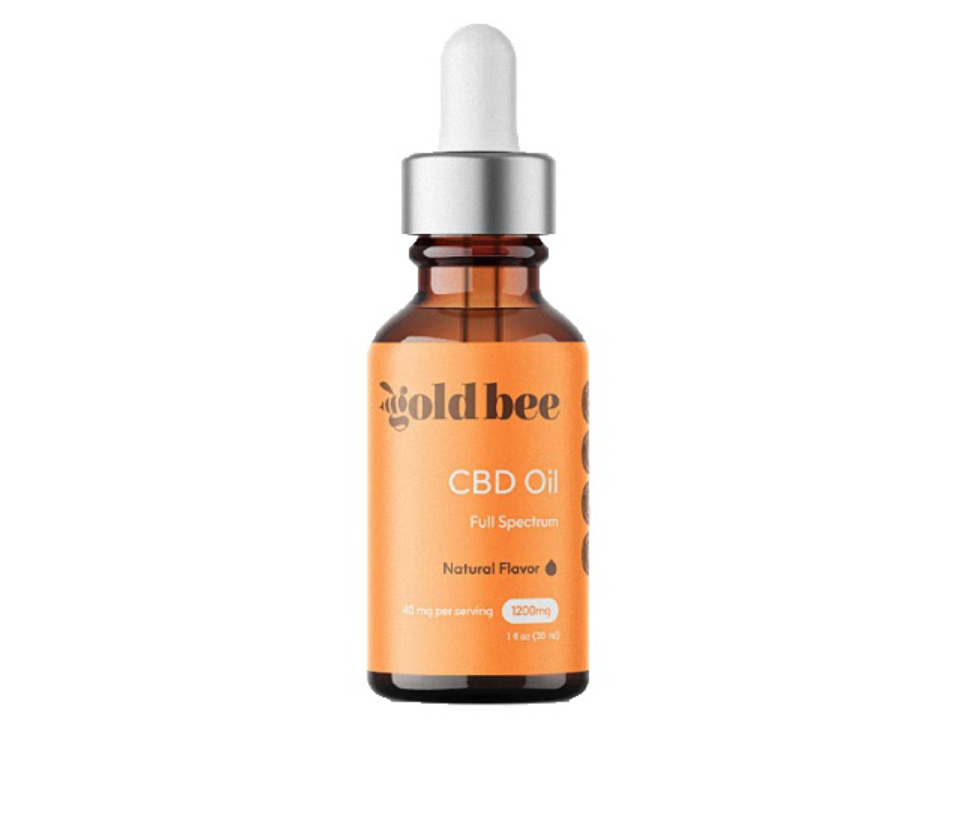
Pros:
- 100% organic, US-grown hemp
- CO2 extraction
- Full-spectrum CBD
- 40 mg of CBD/mL
- Third-party tested for potency and safety
- Unique product selection
Cons:
- Only one strength available
- Limited flavor options
Why we recommend the Gold Bee CBD oil for sleep:
Gold Bee makes 100% organic CBD oils, so if you’re looking for the best quality of ingredients, that’s exactly what you’ll get with this company. The Gold Bee CBD oil is available in one potency variant, including 1200 mg of CBD, which translates into 40 mg of CBD per milliliter. Most CBD users don’t take more than 40 mg of CBD daily, so this product should fit within most monthly budgets.
Gold Bee is a newer brand that’s gaining popularity in the CBD industry. You can easily find mentions about these guys from reputable media sites such as Observer and CFAH among the top CBD brands in the market.
Similar to Royal CBD, Gold Bee uses full-spectrum CBD in its products, ensuring that lower doses maintain efficacy. This is a great product for both beginners and experienced users alike. Even the flavored version — Kiwi — is sweetened with organic honey from Brazillian rainforests, which is a sign that the company is committed to quality.
Gold Bee also offers other CBD formats, such as capsules, gummies, and honey sticks — providing batch-specific lab reports for every product.
3. Runner Up: CBD Pure Oil

Pros:
- Organic hemp
- CO2 extraction
- 33 mg of CBD/mL
- Lab-tested for potency and purity
- 90-day money back guarantee
Cons:
- No high-strength CBD oils
- No flavored options
Why we recommend CBD Pure CBD oil for sleep
CBD Pure is a company with a well-established reputation thanks to its high transparency standards and the best quality assurance program of all brands that offer CBD oil for sleep. The CBD Pure oil comes in four concentrations: 100 mg, 300 mg, 600 mg, and 1000 mg of CBD per bottle — providing between 3.3 mg and 33 mg of CBD per milliliter. The hemp in these full-spectrum CBD oils comes from organic farms in Colorado, and the products are lab-tested for potency and purity. In our experience, these CBD oils work better for sleep than some of the more potent products from other brands that we’ve tested for the purpose of this ranking.
CBD Pure also has an appealing 90-day money-back guarantee, allowing customers to return their products within 90 days for a full refund if they aren’t satisfied with the effects. It’s a sign that the brand is confident about the quality of its products.
Unfortunately, CBD Pure hasn’t yet introduced any flavored options for its CBD oil. Currently, it’s available in the natural version, but if you don’t like the taste of natural CBD oil, you can check the company’s soft gel capsules if you’re looking for a convenient way to use CBD for sleep.
CBD and Sleep: Just the Facts
If you’ve been having trouble sleeping, and used common treatment options but to no avail, CBD may be a natural and effective alternative for improving the quality of your rest — and the functioning of your sleep cycle.
But, before we elaborate on the best ways to effectively use CBD for sleep, let’s take a closer look at the problem of sleep deprivation, including the root causes, types, symptoms, and long-term effects on our health.
Why Do I Have Problems Sleeping?
There is a broad spectrum of sleeping disorders, the most common being insomnia. People may experience trouble sleeping for a lot of reasons; it may be helpful to rule things out by determining the actual problem and its area. Insomnia is broken down into three main categories — each with its own number of potential triggers.
- Non–restorative sleep – often neglected by people, this form of insomnia involves sleeping throughout the night, but waking up tired as if you’ve gotten no sleep at all. The symptoms may not be as apparent as they are in other types of insomnia, but for some reason, it prevents people from entering the deep sleep stage during the night, when most restorative processes take place. Non-restorative sleep is the most difficult to diagnose and usually calls for the assistance of sleep analysis at a medical center to get down to the root cause.
- Onset insomnia – in this type of insomnia, sufferers have a hard time falling asleep at night, which is often caused by a stream of racing thoughts or anxiety before bed.
- Sleep maintenance insomnia – as you may guess by the name, sleep maintenance insomnia involves waking up at some point very early in the morning. It may happen several times throughout the night, or just once, but it makes it extremely difficult to fall back asleep.
Regardless of the root cause, sleep deprivation can impact several areas of our health. The most obvious is the brain function, where the lack of sleep can lead to “brain fog,” mood swings, poor decision making, trouble focusing, lapses in memory, and irritability. From the physical point of view, insufficient amounts of quality rest can affect the health, immune systems, muscles, and digestive organs.
Here we explain some of the possible causes for each form of insomnia:
| Non-Restorative Sleep | Onset Insomnia (Trouble Falling Asleep) | Maintenance Insomnia (Trouble Staying Asleep) |
|
|
|
A 2010 review on sleep deprivation reported that insufficient sleep duration at night is the risk factor of early death.
Common signs of sleep deprivation include:
- A poor response to stress
- Bags and shadows under the eyes
- Daytime fatigue
- Excessive sleepiness
- Irritability
- Mood swings
- Muscle weakness
- Trouble concentrating
- Yawning
In the next section, we present the negative long-term impact of not getting enough sleep throughout the night.
The Side Effects of Not Getting Enough Quality Sleep
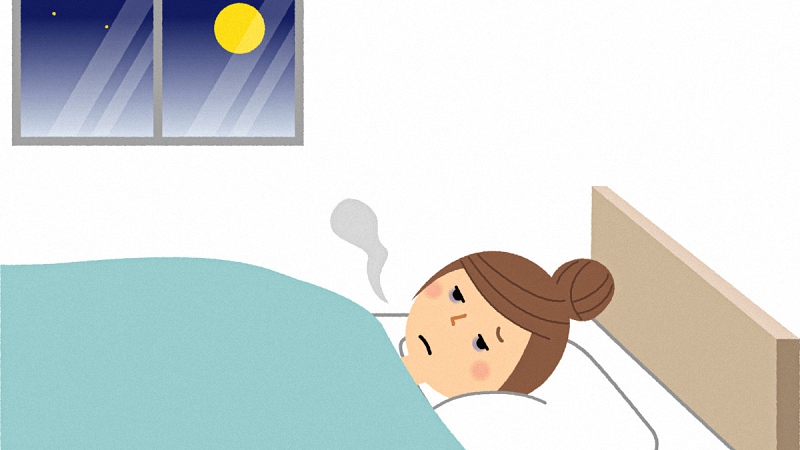
Depositphotos
Ensuring the right amount and quality of sleep is necessary for restorative processes to take place within our bodies. You can’t make up for a sleepless night by trying to sleep longer for the next few days — there’s no workaround for it. Humans simply need 7–9 hours of sleep each night.
Falling to meet this threshold can severely impact your health over time. Chronic lack of sleep can drain you of physical energy and limit your cognitive capacity. Researchers have linked sleep deprivation to a whole array of health concerns, from weight gain to poor immune function and high blood pressure.
Here’s what can happen if you’re missing out on the recommended 7–9 hours of shut-eye nightly:
- Higher risk of heart disease
- High blood pressure (Hypertension)
- Increased chance of getting type II diabetes
- Lowered immune function
- Low sex drive
- Mood instability
- Memory problems
- Poor concentration
- Weight gain
Common Treatments for Sleep Deprivation and their Limitations
The majority of sleeping pills prescribed by doctors fall into the category of sedative-hypnotics — a specific type of drugs used to make the user feel sedated by numbing the central nervous system. The most common class in this category are benzodiazepines like Ambien, halcion, Xanax, and Valium. Similar pharmaceuticals such as Sonata or Tramadol are also prescribed and exert the same actions on the brain..
These drugs interact with the GABA receptors in the brain, which is sort of a hand brake for our neurological activity. When you take benzodiazepines, they essentially slow down electrical signals, blocking them and leading to feelings of drowsiness and relaxation.
Other than working effectively for putting the user to sleep, most sleeping pills have a darker side that many people aren’t familiar with.
Sedative hypnotics are strongly addictive by nature. It takes only a few doses for the body to adapt and resist the effects of these medications. Long-term use requires increasing the dosage to get the same effect. Discontinuation of the treatment may trigger severe withdrawal symptoms, such as anxiety, paranoia, and insomnia.
There are also a lot of acute adverse reactions, including:
- Changes in appetite
- Constipation
- Chronic migraines
- Daytime sleepiness
- Diarrhea
- Dry mouth or throat
- General malaise
- Heartburn
- Palm sweats
- Problems with memory and attention
- Tingling or burning in the arms, legs or feet
It’s easy to understand why some people may feel apprehensive about undergoing a benzodiazepine treatment — and thus are looking for natural alternatives such as CBD oil.
CBD for Sleep: How it Works
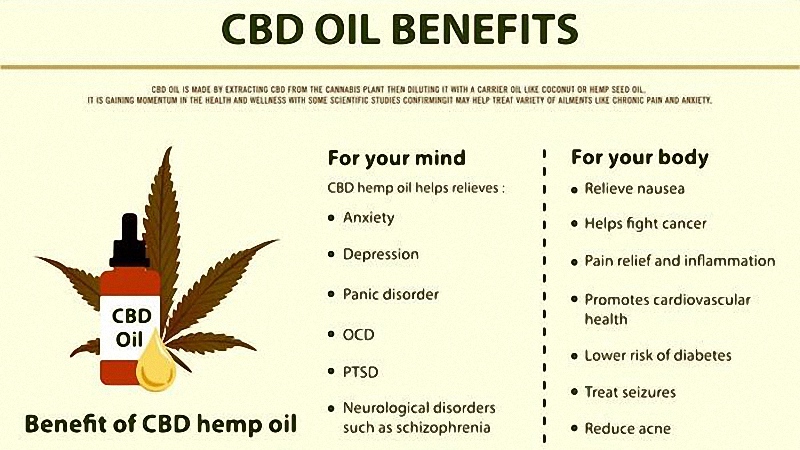
Depositphotos
A lot of people are turning to CBD oil to support healthy sleep patterns because of the remarkably better safety profile and a similar level of relief. We’re not saying that CBD is anywhere near as strong as pharmaceutical sedatives, but it doesn’t involve the same dangerous side effects. CBD can offer significant benefits towards sleep without making the body dependent on it.
CBD works better along with other changes to diet and lifestyle — such as avoiding exposure to stress, spending time to meditate or practice other relaxation techniques before bed, staying active throughout the day, and switching from empty calories to nutrient-dense food.
Combined with these changes, CBD should help you improve your sleep hygiene to deliver the kind of support you need to get enough time of quality sleep.
Here are the most prominent benefits of CBD for sleep:
1. CBD May Reduce Anxiety
In a nutshell, CBD acts on the GABA receptors in the brain, so it uses a similar mechanism to hypnotic-sedatives. However, unlike these medications, CBD doesn’t activate the GABA directly; instead, it changes its shape so that it effectively processes the GABA-A neurotransmitter. As a result, GABA can slow down neurological activity to prepare a person to sleep. The modulation of the GABA receptor also results in lowered anxiety, which is one of the most common concomitant symptoms in patients with insomnia.
Feeling worried, anxious, or uneasy can make it extremely difficult to fall asleep. As reported by the Anxiety and Depression Association of America (ADAA), anxiety disorders are the major trigger of an array of sleep disturbances, including insomnia.
In a three-month study posted in the Permanente Journal, the researchers analyzed the health records of 72 patients who took CBD for sleep and anxiety. The study indicated that anxiety levels in both groups dropped substantially after their CBD treatment. Those with sleeping problems reported improvements in their sleep quality in the first month of the experiment.
2. CBD May Keep You Longer in the Deep Sleep Stage
If you’re suffering from maintenance insomnia — you can’t stay asleep or wake up feeling tired — this benefit of CBD may prove particularly important. Deep sleep is paramount for decent rest. If you only remain in the light sleep stage for the entire night, it’s easy to wake up under the slightest stimuli. Sometimes, it can be difficult to fall back asleep again when we wake up from this state.
Studies suggest that CBD extends the time we spend in the deep sleep stage — the one during which we regenerate — while reducing the time spent in REM sleep, the stage responsible for dreams and rapid eye movements.
People who have fewer dreams often enjoy better-quality sleep; the symptoms of anxiety start to back away, their memory improves, and they are more in-the-zone during the day. Consequently using CBD for sleep may contribute to the overall improvement of your sleep cycles.
3. CBD May Relieve Pain
Chronic pain is another common cause of sleep deprivation, affecting millions of Americans every year. Sources of pain vary, but no matter the source, if the pain is intense enough, you can forget about getting enough of the shut-eye time. Pain reduction is one of the most talked about benefits of CBD. By acting on the endocannabinoid system, CBD may modulate immune response, reduce inflammation, and change the way pain signals are sent from the neurons to the brain.
CBD Dosage for Sleep: How Much Should I Take?

Shutterstock
There is no such thing as the best CBD dosage for sleep because every person is different and may struggle with different underlying conditions. Moreover, low and high doses of CBD can produce different effects, which is further influenced by the time of the day you take it.
For example, low doses of CBD taken in the morning may provide the best results for people whose sleep problems derive from the lack of attention and focus during the day. If you stay productive most of the time, your body will get ‘notified’ that your brain is tired and it’s time to prepare for sleep. On the other hand, when you’re unable to focus during the day, your brain will wake up in the evening because it thinks you haven’t done anything constructive — causing trouble falling asleep.
High doses of CBD taken in the evening can produce a sedating effect due to a temporary drop in blood pressure. As you begin to breathe slowly, you may be able to enter the first stage of sleep faster. Higher amounts of CBD are also more effective for pain management.
The best way to determine the best CBD dosage for your sleep problems is to go through some trial and error. Start with a low dose, say, 5 mg of CBD, and increase it every day by 2 mg until you start seeing the difference. Keep playing around with the amount of CBD in small intervals until you find your effective dosage.
The more experience you gain with CBD, the better you’ll begin to maneuver with the dosage to achieve the desired effects. If you experience any adverse effects, decrease the dose or take CBD with food.
How to Search for High-Quality CBD Oil for Sleep Online
We recommend that you do thorough research on the companies selling CBD oil. There are a lot of great products for sale, but a lot of fake ones as well. Sometimes it can be difficult to tell the difference until you try these products first hand. However, you can minimize the risk by choosing a reputable supplier.
Below we share a few tips on how to find a trustworthy CBD brand.
Where to Find Quality of CBD Products For Sleep Near Me?
The best CBD products for sleep come from popular brands that can ensure 4 quality pillars. You can easily check them by asking the following questions:
- Is the hemp organic? The quality of CBD oil largely depends on the source of hemp. Any impurities in the soil, as well as dangerous additives like pesticides, can penetrate into the plant, accumulating in the leaves, stems nad, flowers as the plant grows and matures. The best CBD oils for sleep are made from organic hemp that grows in clean and nutrient-rich soil. Such plants are a great sourcing material for CBD extracts.
- Does the manufacturer use safe extraction methods? CBD can be extracted using different solvents, from ice-cold water to alcohol, butane, hexane, or CO2. Solvents like butane and hexane are highly flammable and can leave a toxic residue if not purged properly. Alcohol extraction is relatively safe but provides inconsistent yields. That’s why reputable companies employ CO2 extraction; this method doesn’t use additional heat or harsh solvents, resulting in clean and safe products.
- Does the product come with a certificate of analysis (COA)? Certificates of analysis are documents from third-party laboratories that the manufacturer receives once the product has passed content analysis. These labs check for the CBD content, the entire cannabinoid profile, and potential contaminants in the tested sample. Companies should publish their lab reports online or, at least, send them via email.
- Are there other herbs and ingredients in your CBD oil for sleep? Most CBD oils use a full spectrum extract or pure CBD mixed with an inert oil like MCT oil. However, some products are formulated specifically to address sleep problems. Common additives that can enhance the efficacy of CBD include melatonin, ashwagandha, magnesium, hops, magnolia, passionflower, l-theanine, and passionflower.
Final Thoughts
Chronic sleep deprivation is a serious civilizational problem. As a matter of fact, insomnia has been placed among the most common contemporary diseases, and if neglected, it can result in severe neurological conditions on top of other health problems. If you’re seeking a natural aid to your sleep, studies suggest that CBD may be a viable tool.
CBD’s interaction with the endocannabinoid system, which is heavily involved in sleep regulation and recovery, makes it an appealing alternative to conventional treatments, which carry a strong risk of addiction and are not recommended for long-term use due to their aforementioned side effects.
We hope our guide has helped you understand the nature of CBD and its relationship with our sleep cycles — and what to look for if you want to find the best product for sleep. Our top pick is Royal CBD, but you can check our top 3 list for other quality CBD oil products as well.
Advertising disclosure: We may receive compensation for some of the links in our stories. Thank you for supporting LA Weekly and our advertisers.

